北师大版(2019) 必修第一册 Unit 1 Life Choices Lesson 1 Lifestyles Life Choices 课件(69张)
文档属性
| 名称 | 北师大版(2019) 必修第一册 Unit 1 Life Choices Lesson 1 Lifestyles Life Choices 课件(69张) | 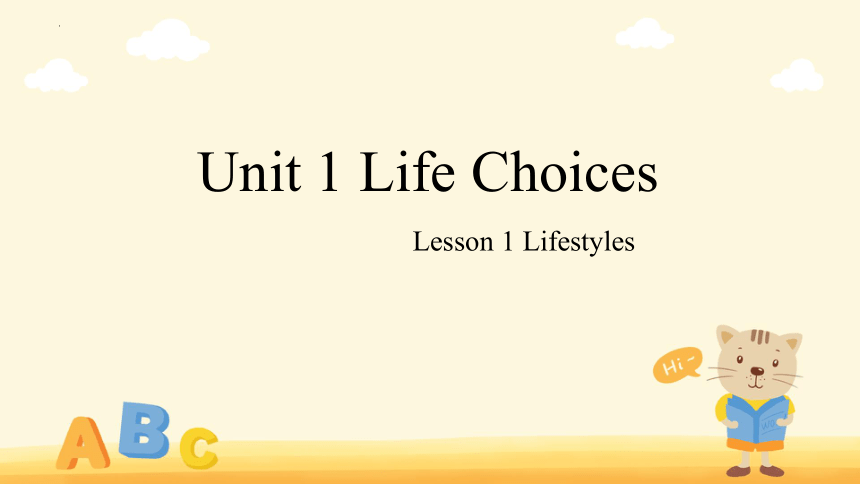 | |
| 格式 | pptx | ||
| 文件大小 | 2.2MB | ||
| 资源类型 | 教案 | ||
| 版本资源 | 北师大版(2019) | ||
| 科目 | 英语 | ||
| 更新时间 | 2022-09-17 17:37:13 | ||
图片预览

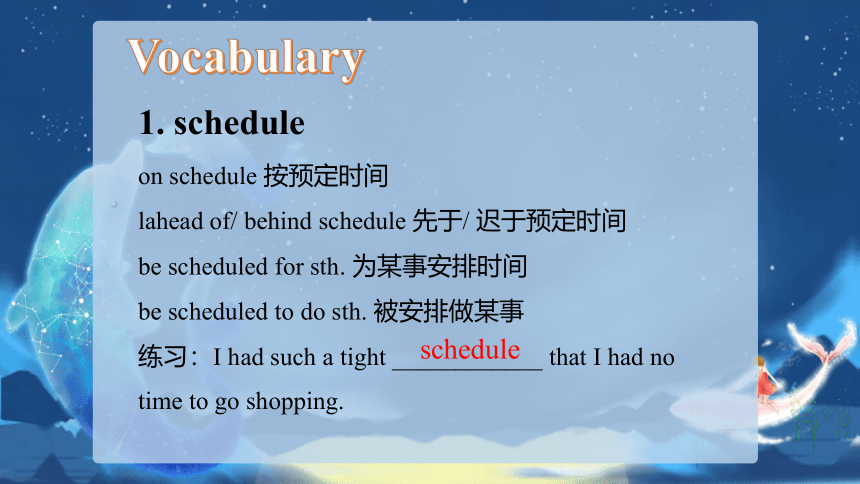
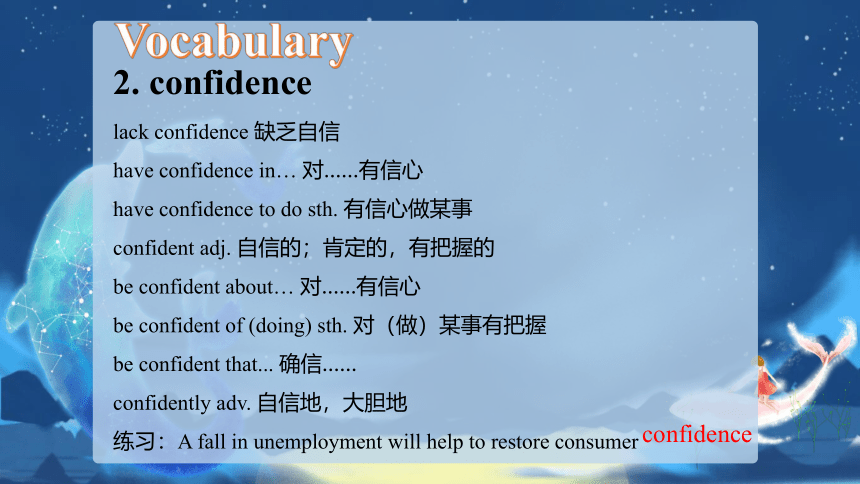
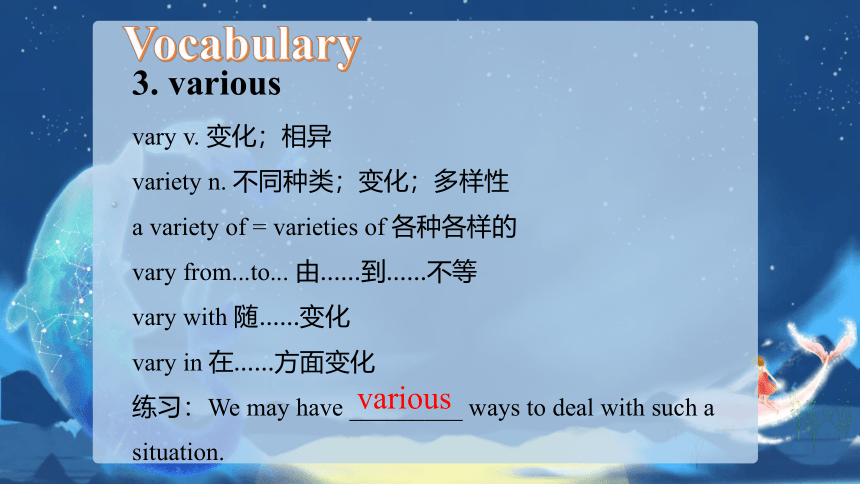
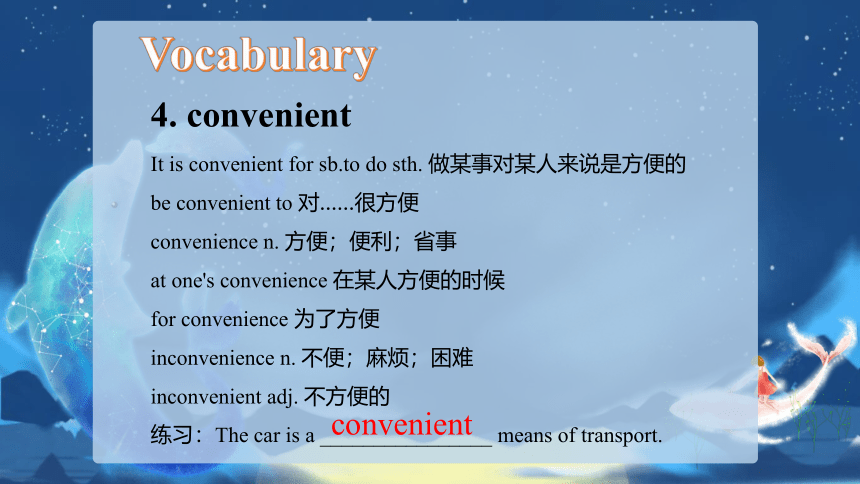


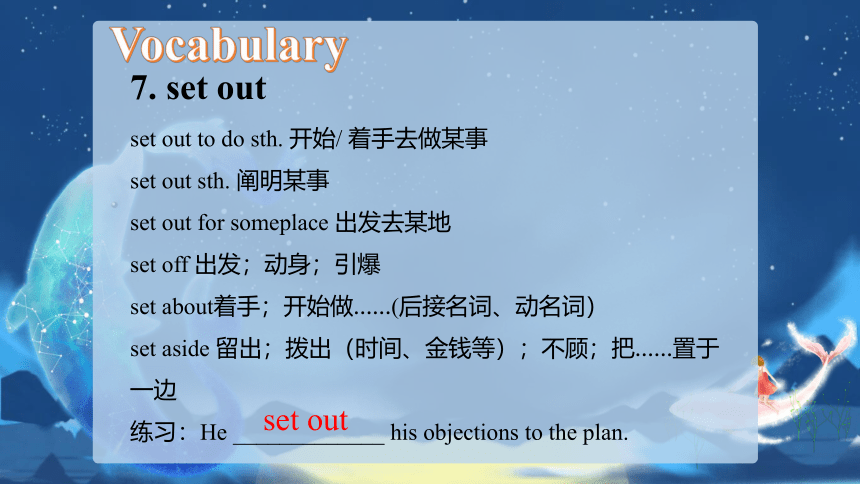

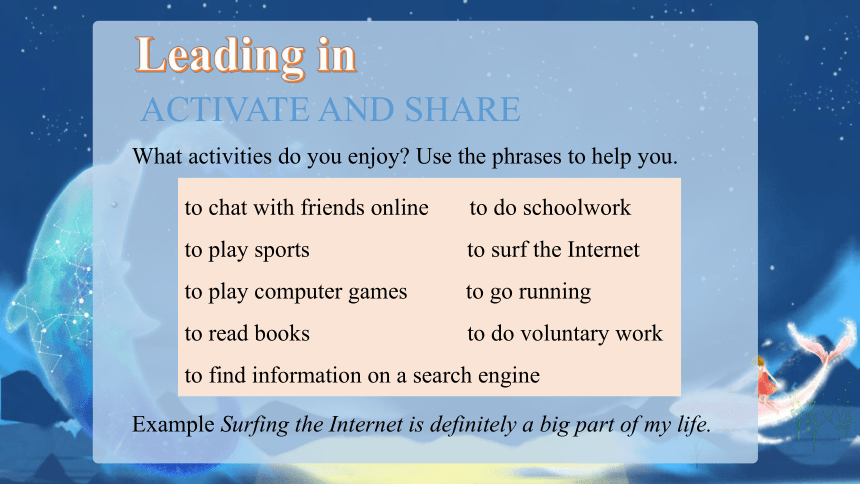


文档简介
(共69张PPT)
Unit 1 Life Choices
Lesson 1 Lifestyles
Vocabulary
1. schedule
on schedule 按预定时间
lahead of/ behind schedule 先于/ 迟于预定时间
be scheduled for sth. 为某事安排时间
be scheduled to do sth. 被安排做某事
练习:I had such a tight ____________ that I had no time to go shopping.
schedule
2. confidence
lack confidence 缺乏自信
have confidence in… 对……有信心
have confidence to do sth. 有信心做某事
confident adj. 自信的;肯定的,有把握的
be confident about… 对……有信心
be confident of (doing) sth. 对(做)某事有把握
be confident that... 确信……
confidently adv. 自信地,大胆地
练习:A fall in unemployment will help to restore consumer __________.
Vocabulary
confidence
3. various
vary v. 变化;相异
variety n. 不同种类;变化;多样性
a variety of = varieties of 各种各样的
vary from...to... 由……到……不等
vary with 随……变化
vary in 在……方面变化
练习:We may have _________ ways to deal with such a situation.
various
Vocabulary
Vocabulary
4. convenient
It is convenient for sb.to do sth. 做某事对某人来说是方便的
be convenient to 对……很方便
convenience n. 方便;便利;省事
at one's convenience 在某人方便的时候
for convenience 为了方便
inconvenience n. 不便;麻烦;困难
inconvenient adj. 不方便的
练习:The car is a ________________ means of transport.
convenient
5. recover
recover from 从……中恢复
recover oneself 静下心来
recover… from… 从……找回……
recovery n. 恢复,痊愈;复苏;取回,收回
discover vt. 发现
cover vt. 覆盖;包括 n. 盖子
uncover vt. 揭露;揭去……的盖子
练习:It would be at least three months before he could _________.
recover
Vocabulary
6. challenge
accept/ take up a challenge 接受挑战
face/ meet a challenge 面对挑战,应对挑战
a challenge to (to为介词) 对……的挑战
challenger n. 挑战者
challenging adj. 有挑战性的
练习:The defeat of cholera of its day was a real ___________ to many scientists.
challenge
Vocabulary
7. set out
set out to do sth. 开始/ 着手去做某事
set out sth. 阐明某事
set out for someplace 出发去某地
set off 出发;动身;引爆
set about着手;开始做……(后接名词、动名词)
set aside 留出;拨出(时间、金钱等);不顾;把……置于一边
练习:He _____________ his objections to the plan.
set out
Vocabulary
8. all in all
after all 置于句首,强调看法,意为“毕竟,终究”;置于句尾,强调语气转折,意为“尽管,然而”
above all 首先,最重要的是 in all 总计,合计
at all 根本,究竟 all alone 独自
all around (在……) 周围,到处 all at once 突然
all through 一直,在整个……期间
all the same (虽然……)还是,仍然
all along 一直,自始至终 all over 浑身;到处
练习:_______________, it had been a great success.
All in all
Vocabulary
What activities do you enjoy Use the phrases to help you.
ACTIVATE AND SHARE
to chat with friends online to do schoolwork
to play sports to surf the Internet
to play computer games to go running
to read books to do voluntary work
to find information on a search engine
Leading in
Example Surfing the Internet is definitely a big part of my life.
Look at the photos a and b. Read the self-introductions below. What kind of lifestyle do you think the two students have
Joe likes to spend his time online because he says he is a "digital native".
Li Ying likes to set goals for herself and try her best to achieve them because she calls herself a "go-getter".
READ AND EXPLORE
Read the two texts. Underline Joe's online activities and Li Ying's study habits.
Joe: chat with friends, do schoolwork, watch films, read the daily news and other interesting articles, shop online, compare the quality and prices from different online shops, play computer games
READ AND EXPLORE
Read the two texts. Underline Joe's online activities and Li Ying's study habits.
Li Ying: set a goal for every subject, be attentive in all classes and think actively, use time well, do homework in spare time in school, use any other spare time to review things learnt that day
READ AND EXPLORE
Read again. Take notes about Joe's and Li Ying's lifestyles and share what you have found about them. Try to explain what a "digital native" and a "go-getter" mean.
READ AND EXPLORE
Digital Native Go-getter
· chat with friends online · play computer games · … · study with a clear goal
· be attentive in what they do
· …
List the positive (P) and negative (N) aspects of Joe's and Li Ying's lifestyles.
READ AND EXPLORE
Joe
P
N
do schoolwork, read the daily news and other interesting articles, shop online
chat with friends, watch films
List the positive (P) and negative (N) aspects of Joe's and Li Ying's lifestyles.
READ AND EXPLORE
Li Ying
P
N
set a goal for every subject, do well in every subject, attentive in all classes and think actively, read books of all kinds, active member of school's long-distance running team and volunteering club, do homework
no leisure time
Read Joe's introduction again. How has he organised his introduction
READ AND EXPLORE
General and brief introduction
Paragraph 1
The things Joe does online
Paragraph 2
Problems of being online and possible solutions
Paragraph 3
Replace the underlined words and phrases with the words and phrases from the texts.
1 Joe does a lot of things online. ( )
2 He talks with his online friends. ( )
3 When shopping online, it's very easy and quick to compare the quality and prices of goods. ( )
4 Joe's parents are worried that he could become a person who spends a lot of free time on the Internet. ( )
READ AND EXPLORE
a wide range of
chats
convenient
an Internet addict
Replace the underlined words and phrases with the words and phrases from the texts.
5 His mum thinks that it's important to meet friends in person sometimes. ( )
6 Li Ying tries to keep her reading list most recent. ( )
7 She often uses the time on bus to look again at the things she has learnt. ( )
8 What she tries to achieve is to prepare herself for university. ( )
READ AND EXPLORE
from time to time
updated
revise
Her target
Complete the text with the words and phrases below.
READ AND EXPLORE
in fact because also for example
Joe is a "digital native". He does lots of things online, 1 ______________, chatting with his friends.
Joe's parents are worried that he may become an "Internet addict", 2 ___________ they think he plays computer games all the time and chats too much with online friends.
for example
because
Complete the text with the words and phrases below.
READ AND EXPLORE
in fact because also for example
They are 3 ___________ worried that he may not be able to tell whether these friends are real friends. 4 ___________, Joe knows he should spend more time enjoying real life.
also
In fact
FOCUS ON LANGUAGE: INFINITIVES
1. Read each sentence and underline the infinitive. Does it function as a subject (主语), object (宾语), predicative (表语), attribute (定语), adverbial (状语) or object complement (宾语补语)
1 My mum keeps telling me to go out with my school friends instead.
2 It's important to meet friends in person from time to time, not just on social media.
_____
object complement
____
subject
FOCUS ON LANGUAGE: INFINITIVES
1. Read each sentence and underline the infinitive. Does it function as a subject (主语), object (宾语), predicative (表语), attribute (定语), adverbial (状语) or object complement (宾语补语)
3 When I set out to do something, I do my best to achieve it.
4 My target is to prepare myself for my degree in biology at university.
5 Li Ying is the first person to join the volunteering club in her class.
_________
adverbial
______
predicative
____
attribute
2. Complete the blog entry with the correct form of the words in brackets.
I wake up at six o'clock every morning. It 1 ____________ (take) me less than 15 minutes 2 ____________ (wash), get changed, have breakfast and leave home. I'm always the first person 3 ____________ (get) to my class. The mornings are always very busy and the afternoons are even busier! By around five o'clock,
takes
to wash
to get
FOCUS ON LANGUAGE: INFINITIVES
2. Complete the blog entry with the correct form of the words in brackets.
I usually 4 ____________ (find) time 5 ____________ (do) my paperwork and preview the lessons. You may think that it 6 ____________ (be) boring 7 ____________ (do) the same thing every day, but I like being busy. (Wang Qing, 16 years old)
find
to do
is
FOCUS ON LANGUAGE: INFINITIVES
to do
Group Work Discuss your ideal lifestyle with a partner. What is your ideal lifestyle Compared with your current lifestyle, how is it different
EXPRESS YOURSELF
Do you agree with the idea "'I don't have time', often means 'it's not a priority'." Why or why not
EXPRESS YOURSELF
1. 不定式的时态和语态
(1)不定式的形式
不定式有六种形式,以write为例,如下表:
语法:动词不定式
时态 主动语态 被动语态
一般式 to write to be written
完成式 to have written to have been written
进行式 to be writing
完成进行式 to have been writing
1. 不定式的时态和语态
(2)不定式的使用情况
① 一般式:不定式的动作与谓语动作同时发生或在谓语动作之后发生。
He seems to know this.
他似乎知道这件事。
语法:动词不定式
1. 不定式的时态和语态
(2)不定式的使用情况
② 进行式:不定式的动作与谓语动作同时发生,并强调动作的持续性或正在进行。
He pretended to be working hard.
= He pretended that he was working hard.
他假装工作很努力。
语法:动词不定式
1. 不定式的时态和语态
(2)不定式的使用情况
③ 完成式:不定式的动作发生在谓语动作之前或已经发生。
Scientists claimed to have made a major breakthrough in the fight against cancer in the past three months.
科学家们宣称在过去的三个月里在攻克癌症方面已有重大的突破。
语法:动词不定式
1. 不定式的时态和语态
(2)不定式的使用情况
④ 完成进行式:强调不定式的动作从过去某一时刻起一直持续到某一时刻,强调动作的持续性,不强调结果。
The rain was said to have been falling for a week.
据说雨已经下了一周了。
语法:动词不定式
1. 不定式的时态和语态
(2)不定式的使用情况
⑤ 被动式:不定式的逻辑主语是不定式动作的承受者。
The factory to be built here next year is a car factory.
明年要在这里建的工厂是一家汽车制造厂。
语法:动词不定式
2. 动词不定式的句法功能
(1)作主语(可用形式主语it)
To master English gives us much help in the study of science.
掌握好英语在科学研究方面给了我们很大帮助。
Is it necessary to complete the design before National Day
有必要在国庆节前完成这项设计吗?
语法:动词不定式
2. 动词不定式的句法功能
(2)作表语(说明主语的内容)
Her wish is to become a college student.
她的愿望是成为一名大学生。
语法:动词不定式
2. 动词不定式的句法功能
(2)作表语(说明主语的内容)
注意:
动词不定式和动名词都可作主语和表语。一般来说,表示比较抽象的一般行为多用动名词;表示具体的某个动作,特别是将来的动作时,多用动词不定式。有时两者可以互换。
语法:动词不定式
2. 动词不定式的句法功能
(2)作表语(说明主语的内容)
注意:
His job is to write reports for the newspaper.
他的工作是为报社写报道。
The problems remain to be unsettled.
问题还没有解决。
语法:动词不定式
2. 动词不定式的句法功能
(2)作表语(说明主语的内容)
注意:
当主语部分含有动词do时,做表语的不定式可以省略 to。
What I want to do is (to) have a good rest.
我想做的事是好好休息一下。
语法:动词不定式
2. 动词不定式的句法功能
(3)不定式作宾语
① 有些动词后常跟不定式作宾语,如agree, aim, attempt, tend, determine, choose, decide, demand, expect, fail, learn, manage, offer, plan, prepare, pretend, promise, refuse, seem, hope, wish 等。
I decided to buy an MP4 to learn English.
我决定买个MP4来学英语。
语法:动词不定式
2. 动词不定式的句法功能
(3)不定式作宾语
① 口诀助记
三个希望两答应:hope, wish, want, agree, promise
两个要求莫拒绝:demand, ask, refuse
设法学会做决定:manage, learn, decide
不要假装在选择:pretend, choose
语法:动词不定式
2. 动词不定式的句法功能
(3)不定式作宾语
② 有些动词后可跟不定式作宾语,也可跟动名词作宾语,但意思大不相同,如forget, remember, mean, try等;有些动词后接不定式和动名词作宾语时意思差别不大,如start, begin, hate, like 等。
Mary begins to sweep/ sweeping her room.
玛丽开始打扫她的房间。
语法:动词不定式
2. 动词不定式的句法功能
(3)不定式作宾语
Remember to turn off the lights when you leave the room.
在你离开这个房间之前,记得把灯关了。(现在灯还没有关)
I remembered turning off the lights when I left the room.
我记得我离开那个房间时把灯关了。(灯已经关了)
语法:动词不定式
2. 动词不定式的句法功能
(3)不定式作宾语
③ 在一些复合结构中,可用it作形式宾语,而将真正的宾语——不定式后置。构成此结构的动词有make, find, feel, believe, consider, think等。
I believe it useless to argue with him.
我认为和他争吵是没有用的。
I feel it my duty to help others.
我觉得帮助别人是我的职责。
语法:动词不定式
2. 动词不定式的句法功能
(4)不定式作定语
① 不定式作定语通常要放在被修饰词的后面,往往表示将要发生的动作。
The weather will be sunny in the days to come.
未来几天将是晴天。
语法:动词不定式
2. 动词不定式的句法功能
(4)不定式作定语
② 中心词是序数词、形容词最高级、the last/ the only /the next或被这些词修饰时,用不定式作定语。
Zhang Jian is the first Chinese to swim across the Bohai Sea.
张健是第一个横渡渤海的中国人。
语法:动词不定式
2. 动词不定式的句法功能
(4)不定式作定语
③ 抽象名词time, way, reason, chance, courage, opportunity, ability等后以及不定代词something, nothing, little等后常用不定式作定语。
A subway is an effective way to solve traffic problems in a big city.
地铁是解决大城市交通问题的一个有效方法。
语法:动词不定式
2. 动词不定式的句法功能
(4)不定式作定语
④ “there be+主语+to do”和“have sth. to do”结构中,不定式也做作后置定语。
There is nothing to worry about.
没什么可担心的。
语法:动词不定式
2. 动词不定式的句法功能
(4)不定式作定语
注意:
① 不定式作定语时,往往与被修饰词有动宾关系,若构成不定式的动词是不及物动词,其后须有相应的介词,如:
a piece of paper to write on
语法:动词不定式
2. 动词不定式的句法功能
(4)不定式作定语
注意:
② 若不定式的逻辑主语是句子的主语,不定式用主动式;若其逻辑主语不是句子的主语,则不定式用被动式。如:
I have something to be washed. (wash 所表示的动作不是由主语I发出的)
语法:动词不定式
2. 动词不定式的句法功能
(4)不定式作定语
注意:
③ 如果其动词要求用动词不定式作宾语,或者其形容词要接动词不定式作补语,则相应的名词一般用动词不定式作定语。
tend to do = tendency to do decide to do = decision to do
be curious to do = curiosity to do
语法:动词不定式
2. 动词不定式的句法功能
(5)不定式作状语
① 不定式作目的状语
They took exercise every day to keep healthy.
为了保持健康,他们每天运动。
语法:动词不定式
2. 动词不定式的句法功能
(5)不定式作状语
② 不定式作结果状语
常用如下结构:
so+形容词/ 副词+as to do 如此……以至于……
such +形容词/ 名词+as to do 如此……以至于……
enough+名词+to do 足够……
名词/ 形容词/ 副词+ enough + to do 足够……
too+形容词/ 副词+to do 太……而不能……
语法:动词不定式
2. 动词不定式的句法功能
(5)不定式作状语
He is not so stupid (such a fool) as to do that.
他还没有蠢到做那种事。
The boy is old enough to go to school.
这个男孩到了上学的年龄了。
注意:不定式短语表示结果时,常与only连用,暗示一种意外的结果。
语法:动词不定式
2. 动词不定式的句法功能
(5)不定式作状语
③ 不定式作原因状语
They jumped with joy to hear the news.
听到这个消息,他们高兴得跳了起来。
语法:动词不定式
2. 动词不定式的句法功能
(5)不定式作状语
④ 不定式作方式状语(常与as if, as though连用)
He raised his hand as if to take off his hat.
他举起手来,像是要把他的帽子摘掉。
语法:动词不定式
2. 动词不定式的句法功能
(5)不定式作状语
⑤ 不定式修饰作表语或宾语补足语的形容词
I'm very glad to see you again.
很高兴又见到你了。
English is not so difficult to learn.
英语并没有那么难学。
语法:动词不定式
2. 动词不定式的句法功能
(6)不定式作宾语补足语
① 动词+宾语+带to的动词不定式
有这种用法的动词有:advise, allow, ask, beg, cause, challenge, drive, encourage, expect, forbid, force, hire, intend, invite, order, permit, persuade, remind, require, teach, tell , want, warn等。
语法:动词不定式
2. 动词不定式的句法功能
(6)不定式作宾语补足语
She asked me to stay there.
她要我待在那里。
He wants these kids to learn to boast (夸) about themselves.
他想要这些孩子学会夸自己。
语法:动词不定式
2. 动词不定式的句法功能
(6)不定式作宾语补足语
② 表示见解、看法的动词+宾语+带to的动词不定式有这种用法的动词(短语)有:believe, consider, declare, discover, feel, find, imagine, judge, suppose, think, understand等。
语法:动词不定式
2. 动词不定式的句法功能
(6)不定式作宾语补足语
We found the rumor to be true.
我们发现这个传闻是真的。
注意:
这类动词后面用作宾语补足语的不定式通常是to be或 to have done。
语法:动词不定式
2. 动词不定式的句法功能
(6)不定式作宾语补足语
③ 感官动词+宾语+不带to的不定式
有这种用法的动词(词组)有:see, notice, watch, look at, observe, hear, listen to, feel等。
I like to listen to the birds sing when I get up early in the morning.
当我清晨起床时,我喜欢听鸟儿歌唱。
语法:动词不定式
2. 动词不定式的句法功能
(6)不定式作宾语补足语
注意:
被动语态中不定式必须带to。
The children were seen to run down the street.
有人看到孩子们沿着这条街跑了。
语法:动词不定式
2. 动词不定式的句法功能
(6)不定式作宾语补足语
④ 使役动词+宾语+不带to的不定式有这种用法的动词有:make, have, let等。
Don't make the children do such heavy work.
别让孩子们干这么重的活。
语法:动词不定式
2. 动词不定式的句法功能
(6)不定式作宾语补足语
注意:① 在被动结构中不定式必须带to,但have一般不用于被动语态。
② get也是使役动词,但它后面做宾语补足语的不定式总是带to。
I got Mary to lend me some money.
我让玛丽借给我一些钱。
语法:动词不定式
2. 动词不定式的句法功能
(6)不定式作宾语补足语
⑤ 表示好恶的动词+宾语+带to的不定式
有这种用法的动词有:dislike, like, prefer, hate, love, want等。
Do you prefer me to do the work by myself
你更愿意我自己做这项工作吗?
注意:这类动词通常不用被动式。
语法:动词不定式
2. 动词不定式的句法功能
(6)不定式作宾语补足语
⑥ 动词短语+宾语+带to的不定式
有这种用法的动词短语有:arrange for, ask for, call on, count on, depend on, long for, rely on, wait for等。
I'm waiting for you to reply.
我等着你回答。
语法:动词不定式
练习
1. Agriculture gave people their first experience of the power of technology ____________ (change) lives.
2. He is thought ____________ (act) foolishly. Now he has no one but himself to blame for losing the job.
3. It's standard practice for a company like this one ____________ (employ) a security officer.
to change
to have acted
to employ
练习
4. ____________ (work) out the difficult maths problem, I have consulted Professor Russell several times.
5. Anxiously, she took the dress out of the package and tried it on, only____________ (find) it didn't fit.
To work
to find
THANK YOU!
Unit 1 Life Choices
Lesson 1 Lifestyles
Vocabulary
1. schedule
on schedule 按预定时间
lahead of/ behind schedule 先于/ 迟于预定时间
be scheduled for sth. 为某事安排时间
be scheduled to do sth. 被安排做某事
练习:I had such a tight ____________ that I had no time to go shopping.
schedule
2. confidence
lack confidence 缺乏自信
have confidence in… 对……有信心
have confidence to do sth. 有信心做某事
confident adj. 自信的;肯定的,有把握的
be confident about… 对……有信心
be confident of (doing) sth. 对(做)某事有把握
be confident that... 确信……
confidently adv. 自信地,大胆地
练习:A fall in unemployment will help to restore consumer __________.
Vocabulary
confidence
3. various
vary v. 变化;相异
variety n. 不同种类;变化;多样性
a variety of = varieties of 各种各样的
vary from...to... 由……到……不等
vary with 随……变化
vary in 在……方面变化
练习:We may have _________ ways to deal with such a situation.
various
Vocabulary
Vocabulary
4. convenient
It is convenient for sb.to do sth. 做某事对某人来说是方便的
be convenient to 对……很方便
convenience n. 方便;便利;省事
at one's convenience 在某人方便的时候
for convenience 为了方便
inconvenience n. 不便;麻烦;困难
inconvenient adj. 不方便的
练习:The car is a ________________ means of transport.
convenient
5. recover
recover from 从……中恢复
recover oneself 静下心来
recover… from… 从……找回……
recovery n. 恢复,痊愈;复苏;取回,收回
discover vt. 发现
cover vt. 覆盖;包括 n. 盖子
uncover vt. 揭露;揭去……的盖子
练习:It would be at least three months before he could _________.
recover
Vocabulary
6. challenge
accept/ take up a challenge 接受挑战
face/ meet a challenge 面对挑战,应对挑战
a challenge to (to为介词) 对……的挑战
challenger n. 挑战者
challenging adj. 有挑战性的
练习:The defeat of cholera of its day was a real ___________ to many scientists.
challenge
Vocabulary
7. set out
set out to do sth. 开始/ 着手去做某事
set out sth. 阐明某事
set out for someplace 出发去某地
set off 出发;动身;引爆
set about着手;开始做……(后接名词、动名词)
set aside 留出;拨出(时间、金钱等);不顾;把……置于一边
练习:He _____________ his objections to the plan.
set out
Vocabulary
8. all in all
after all 置于句首,强调看法,意为“毕竟,终究”;置于句尾,强调语气转折,意为“尽管,然而”
above all 首先,最重要的是 in all 总计,合计
at all 根本,究竟 all alone 独自
all around (在……) 周围,到处 all at once 突然
all through 一直,在整个……期间
all the same (虽然……)还是,仍然
all along 一直,自始至终 all over 浑身;到处
练习:_______________, it had been a great success.
All in all
Vocabulary
What activities do you enjoy Use the phrases to help you.
ACTIVATE AND SHARE
to chat with friends online to do schoolwork
to play sports to surf the Internet
to play computer games to go running
to read books to do voluntary work
to find information on a search engine
Leading in
Example Surfing the Internet is definitely a big part of my life.
Look at the photos a and b. Read the self-introductions below. What kind of lifestyle do you think the two students have
Joe likes to spend his time online because he says he is a "digital native".
Li Ying likes to set goals for herself and try her best to achieve them because she calls herself a "go-getter".
READ AND EXPLORE
Read the two texts. Underline Joe's online activities and Li Ying's study habits.
Joe: chat with friends, do schoolwork, watch films, read the daily news and other interesting articles, shop online, compare the quality and prices from different online shops, play computer games
READ AND EXPLORE
Read the two texts. Underline Joe's online activities and Li Ying's study habits.
Li Ying: set a goal for every subject, be attentive in all classes and think actively, use time well, do homework in spare time in school, use any other spare time to review things learnt that day
READ AND EXPLORE
Read again. Take notes about Joe's and Li Ying's lifestyles and share what you have found about them. Try to explain what a "digital native" and a "go-getter" mean.
READ AND EXPLORE
Digital Native Go-getter
· chat with friends online · play computer games · … · study with a clear goal
· be attentive in what they do
· …
List the positive (P) and negative (N) aspects of Joe's and Li Ying's lifestyles.
READ AND EXPLORE
Joe
P
N
do schoolwork, read the daily news and other interesting articles, shop online
chat with friends, watch films
List the positive (P) and negative (N) aspects of Joe's and Li Ying's lifestyles.
READ AND EXPLORE
Li Ying
P
N
set a goal for every subject, do well in every subject, attentive in all classes and think actively, read books of all kinds, active member of school's long-distance running team and volunteering club, do homework
no leisure time
Read Joe's introduction again. How has he organised his introduction
READ AND EXPLORE
General and brief introduction
Paragraph 1
The things Joe does online
Paragraph 2
Problems of being online and possible solutions
Paragraph 3
Replace the underlined words and phrases with the words and phrases from the texts.
1 Joe does a lot of things online. ( )
2 He talks with his online friends. ( )
3 When shopping online, it's very easy and quick to compare the quality and prices of goods. ( )
4 Joe's parents are worried that he could become a person who spends a lot of free time on the Internet. ( )
READ AND EXPLORE
a wide range of
chats
convenient
an Internet addict
Replace the underlined words and phrases with the words and phrases from the texts.
5 His mum thinks that it's important to meet friends in person sometimes. ( )
6 Li Ying tries to keep her reading list most recent. ( )
7 She often uses the time on bus to look again at the things she has learnt. ( )
8 What she tries to achieve is to prepare herself for university. ( )
READ AND EXPLORE
from time to time
updated
revise
Her target
Complete the text with the words and phrases below.
READ AND EXPLORE
in fact because also for example
Joe is a "digital native". He does lots of things online, 1 ______________, chatting with his friends.
Joe's parents are worried that he may become an "Internet addict", 2 ___________ they think he plays computer games all the time and chats too much with online friends.
for example
because
Complete the text with the words and phrases below.
READ AND EXPLORE
in fact because also for example
They are 3 ___________ worried that he may not be able to tell whether these friends are real friends. 4 ___________, Joe knows he should spend more time enjoying real life.
also
In fact
FOCUS ON LANGUAGE: INFINITIVES
1. Read each sentence and underline the infinitive. Does it function as a subject (主语), object (宾语), predicative (表语), attribute (定语), adverbial (状语) or object complement (宾语补语)
1 My mum keeps telling me to go out with my school friends instead.
2 It's important to meet friends in person from time to time, not just on social media.
_____
object complement
____
subject
FOCUS ON LANGUAGE: INFINITIVES
1. Read each sentence and underline the infinitive. Does it function as a subject (主语), object (宾语), predicative (表语), attribute (定语), adverbial (状语) or object complement (宾语补语)
3 When I set out to do something, I do my best to achieve it.
4 My target is to prepare myself for my degree in biology at university.
5 Li Ying is the first person to join the volunteering club in her class.
_________
adverbial
______
predicative
____
attribute
2. Complete the blog entry with the correct form of the words in brackets.
I wake up at six o'clock every morning. It 1 ____________ (take) me less than 15 minutes 2 ____________ (wash), get changed, have breakfast and leave home. I'm always the first person 3 ____________ (get) to my class. The mornings are always very busy and the afternoons are even busier! By around five o'clock,
takes
to wash
to get
FOCUS ON LANGUAGE: INFINITIVES
2. Complete the blog entry with the correct form of the words in brackets.
I usually 4 ____________ (find) time 5 ____________ (do) my paperwork and preview the lessons. You may think that it 6 ____________ (be) boring 7 ____________ (do) the same thing every day, but I like being busy. (Wang Qing, 16 years old)
find
to do
is
FOCUS ON LANGUAGE: INFINITIVES
to do
Group Work Discuss your ideal lifestyle with a partner. What is your ideal lifestyle Compared with your current lifestyle, how is it different
EXPRESS YOURSELF
Do you agree with the idea "'I don't have time', often means 'it's not a priority'." Why or why not
EXPRESS YOURSELF
1. 不定式的时态和语态
(1)不定式的形式
不定式有六种形式,以write为例,如下表:
语法:动词不定式
时态 主动语态 被动语态
一般式 to write to be written
完成式 to have written to have been written
进行式 to be writing
完成进行式 to have been writing
1. 不定式的时态和语态
(2)不定式的使用情况
① 一般式:不定式的动作与谓语动作同时发生或在谓语动作之后发生。
He seems to know this.
他似乎知道这件事。
语法:动词不定式
1. 不定式的时态和语态
(2)不定式的使用情况
② 进行式:不定式的动作与谓语动作同时发生,并强调动作的持续性或正在进行。
He pretended to be working hard.
= He pretended that he was working hard.
他假装工作很努力。
语法:动词不定式
1. 不定式的时态和语态
(2)不定式的使用情况
③ 完成式:不定式的动作发生在谓语动作之前或已经发生。
Scientists claimed to have made a major breakthrough in the fight against cancer in the past three months.
科学家们宣称在过去的三个月里在攻克癌症方面已有重大的突破。
语法:动词不定式
1. 不定式的时态和语态
(2)不定式的使用情况
④ 完成进行式:强调不定式的动作从过去某一时刻起一直持续到某一时刻,强调动作的持续性,不强调结果。
The rain was said to have been falling for a week.
据说雨已经下了一周了。
语法:动词不定式
1. 不定式的时态和语态
(2)不定式的使用情况
⑤ 被动式:不定式的逻辑主语是不定式动作的承受者。
The factory to be built here next year is a car factory.
明年要在这里建的工厂是一家汽车制造厂。
语法:动词不定式
2. 动词不定式的句法功能
(1)作主语(可用形式主语it)
To master English gives us much help in the study of science.
掌握好英语在科学研究方面给了我们很大帮助。
Is it necessary to complete the design before National Day
有必要在国庆节前完成这项设计吗?
语法:动词不定式
2. 动词不定式的句法功能
(2)作表语(说明主语的内容)
Her wish is to become a college student.
她的愿望是成为一名大学生。
语法:动词不定式
2. 动词不定式的句法功能
(2)作表语(说明主语的内容)
注意:
动词不定式和动名词都可作主语和表语。一般来说,表示比较抽象的一般行为多用动名词;表示具体的某个动作,特别是将来的动作时,多用动词不定式。有时两者可以互换。
语法:动词不定式
2. 动词不定式的句法功能
(2)作表语(说明主语的内容)
注意:
His job is to write reports for the newspaper.
他的工作是为报社写报道。
The problems remain to be unsettled.
问题还没有解决。
语法:动词不定式
2. 动词不定式的句法功能
(2)作表语(说明主语的内容)
注意:
当主语部分含有动词do时,做表语的不定式可以省略 to。
What I want to do is (to) have a good rest.
我想做的事是好好休息一下。
语法:动词不定式
2. 动词不定式的句法功能
(3)不定式作宾语
① 有些动词后常跟不定式作宾语,如agree, aim, attempt, tend, determine, choose, decide, demand, expect, fail, learn, manage, offer, plan, prepare, pretend, promise, refuse, seem, hope, wish 等。
I decided to buy an MP4 to learn English.
我决定买个MP4来学英语。
语法:动词不定式
2. 动词不定式的句法功能
(3)不定式作宾语
① 口诀助记
三个希望两答应:hope, wish, want, agree, promise
两个要求莫拒绝:demand, ask, refuse
设法学会做决定:manage, learn, decide
不要假装在选择:pretend, choose
语法:动词不定式
2. 动词不定式的句法功能
(3)不定式作宾语
② 有些动词后可跟不定式作宾语,也可跟动名词作宾语,但意思大不相同,如forget, remember, mean, try等;有些动词后接不定式和动名词作宾语时意思差别不大,如start, begin, hate, like 等。
Mary begins to sweep/ sweeping her room.
玛丽开始打扫她的房间。
语法:动词不定式
2. 动词不定式的句法功能
(3)不定式作宾语
Remember to turn off the lights when you leave the room.
在你离开这个房间之前,记得把灯关了。(现在灯还没有关)
I remembered turning off the lights when I left the room.
我记得我离开那个房间时把灯关了。(灯已经关了)
语法:动词不定式
2. 动词不定式的句法功能
(3)不定式作宾语
③ 在一些复合结构中,可用it作形式宾语,而将真正的宾语——不定式后置。构成此结构的动词有make, find, feel, believe, consider, think等。
I believe it useless to argue with him.
我认为和他争吵是没有用的。
I feel it my duty to help others.
我觉得帮助别人是我的职责。
语法:动词不定式
2. 动词不定式的句法功能
(4)不定式作定语
① 不定式作定语通常要放在被修饰词的后面,往往表示将要发生的动作。
The weather will be sunny in the days to come.
未来几天将是晴天。
语法:动词不定式
2. 动词不定式的句法功能
(4)不定式作定语
② 中心词是序数词、形容词最高级、the last/ the only /the next或被这些词修饰时,用不定式作定语。
Zhang Jian is the first Chinese to swim across the Bohai Sea.
张健是第一个横渡渤海的中国人。
语法:动词不定式
2. 动词不定式的句法功能
(4)不定式作定语
③ 抽象名词time, way, reason, chance, courage, opportunity, ability等后以及不定代词something, nothing, little等后常用不定式作定语。
A subway is an effective way to solve traffic problems in a big city.
地铁是解决大城市交通问题的一个有效方法。
语法:动词不定式
2. 动词不定式的句法功能
(4)不定式作定语
④ “there be+主语+to do”和“have sth. to do”结构中,不定式也做作后置定语。
There is nothing to worry about.
没什么可担心的。
语法:动词不定式
2. 动词不定式的句法功能
(4)不定式作定语
注意:
① 不定式作定语时,往往与被修饰词有动宾关系,若构成不定式的动词是不及物动词,其后须有相应的介词,如:
a piece of paper to write on
语法:动词不定式
2. 动词不定式的句法功能
(4)不定式作定语
注意:
② 若不定式的逻辑主语是句子的主语,不定式用主动式;若其逻辑主语不是句子的主语,则不定式用被动式。如:
I have something to be washed. (wash 所表示的动作不是由主语I发出的)
语法:动词不定式
2. 动词不定式的句法功能
(4)不定式作定语
注意:
③ 如果其动词要求用动词不定式作宾语,或者其形容词要接动词不定式作补语,则相应的名词一般用动词不定式作定语。
tend to do = tendency to do decide to do = decision to do
be curious to do = curiosity to do
语法:动词不定式
2. 动词不定式的句法功能
(5)不定式作状语
① 不定式作目的状语
They took exercise every day to keep healthy.
为了保持健康,他们每天运动。
语法:动词不定式
2. 动词不定式的句法功能
(5)不定式作状语
② 不定式作结果状语
常用如下结构:
so+形容词/ 副词+as to do 如此……以至于……
such +形容词/ 名词+as to do 如此……以至于……
enough+名词+to do 足够……
名词/ 形容词/ 副词+ enough + to do 足够……
too+形容词/ 副词+to do 太……而不能……
语法:动词不定式
2. 动词不定式的句法功能
(5)不定式作状语
He is not so stupid (such a fool) as to do that.
他还没有蠢到做那种事。
The boy is old enough to go to school.
这个男孩到了上学的年龄了。
注意:不定式短语表示结果时,常与only连用,暗示一种意外的结果。
语法:动词不定式
2. 动词不定式的句法功能
(5)不定式作状语
③ 不定式作原因状语
They jumped with joy to hear the news.
听到这个消息,他们高兴得跳了起来。
语法:动词不定式
2. 动词不定式的句法功能
(5)不定式作状语
④ 不定式作方式状语(常与as if, as though连用)
He raised his hand as if to take off his hat.
他举起手来,像是要把他的帽子摘掉。
语法:动词不定式
2. 动词不定式的句法功能
(5)不定式作状语
⑤ 不定式修饰作表语或宾语补足语的形容词
I'm very glad to see you again.
很高兴又见到你了。
English is not so difficult to learn.
英语并没有那么难学。
语法:动词不定式
2. 动词不定式的句法功能
(6)不定式作宾语补足语
① 动词+宾语+带to的动词不定式
有这种用法的动词有:advise, allow, ask, beg, cause, challenge, drive, encourage, expect, forbid, force, hire, intend, invite, order, permit, persuade, remind, require, teach, tell , want, warn等。
语法:动词不定式
2. 动词不定式的句法功能
(6)不定式作宾语补足语
She asked me to stay there.
她要我待在那里。
He wants these kids to learn to boast (夸) about themselves.
他想要这些孩子学会夸自己。
语法:动词不定式
2. 动词不定式的句法功能
(6)不定式作宾语补足语
② 表示见解、看法的动词+宾语+带to的动词不定式有这种用法的动词(短语)有:believe, consider, declare, discover, feel, find, imagine, judge, suppose, think, understand等。
语法:动词不定式
2. 动词不定式的句法功能
(6)不定式作宾语补足语
We found the rumor to be true.
我们发现这个传闻是真的。
注意:
这类动词后面用作宾语补足语的不定式通常是to be或 to have done。
语法:动词不定式
2. 动词不定式的句法功能
(6)不定式作宾语补足语
③ 感官动词+宾语+不带to的不定式
有这种用法的动词(词组)有:see, notice, watch, look at, observe, hear, listen to, feel等。
I like to listen to the birds sing when I get up early in the morning.
当我清晨起床时,我喜欢听鸟儿歌唱。
语法:动词不定式
2. 动词不定式的句法功能
(6)不定式作宾语补足语
注意:
被动语态中不定式必须带to。
The children were seen to run down the street.
有人看到孩子们沿着这条街跑了。
语法:动词不定式
2. 动词不定式的句法功能
(6)不定式作宾语补足语
④ 使役动词+宾语+不带to的不定式有这种用法的动词有:make, have, let等。
Don't make the children do such heavy work.
别让孩子们干这么重的活。
语法:动词不定式
2. 动词不定式的句法功能
(6)不定式作宾语补足语
注意:① 在被动结构中不定式必须带to,但have一般不用于被动语态。
② get也是使役动词,但它后面做宾语补足语的不定式总是带to。
I got Mary to lend me some money.
我让玛丽借给我一些钱。
语法:动词不定式
2. 动词不定式的句法功能
(6)不定式作宾语补足语
⑤ 表示好恶的动词+宾语+带to的不定式
有这种用法的动词有:dislike, like, prefer, hate, love, want等。
Do you prefer me to do the work by myself
你更愿意我自己做这项工作吗?
注意:这类动词通常不用被动式。
语法:动词不定式
2. 动词不定式的句法功能
(6)不定式作宾语补足语
⑥ 动词短语+宾语+带to的不定式
有这种用法的动词短语有:arrange for, ask for, call on, count on, depend on, long for, rely on, wait for等。
I'm waiting for you to reply.
我等着你回答。
语法:动词不定式
练习
1. Agriculture gave people their first experience of the power of technology ____________ (change) lives.
2. He is thought ____________ (act) foolishly. Now he has no one but himself to blame for losing the job.
3. It's standard practice for a company like this one ____________ (employ) a security officer.
to change
to have acted
to employ
练习
4. ____________ (work) out the difficult maths problem, I have consulted Professor Russell several times.
5. Anxiously, she took the dress out of the package and tried it on, only____________ (find) it didn't fit.
To work
to find
THANK YOU!
同课章节目录
- Unit 1 Life Choices
- Lesson 1 Lifestyles
- Lesson 2 Understanding and Coping with Stress
- Lesson 3 Your Life Is What You Make It
- Unit 2 Sports and Fitness
- Lesson 1 The Underdog
- Lesson 2 Rules of the Game
- Lesson 3 Running and Fitness
- Unit 3 Celebrations
- Lesson 1 Spring Festival
- Lesson 2 Special Occasions
- Lesson 3 Memories of Christmas
